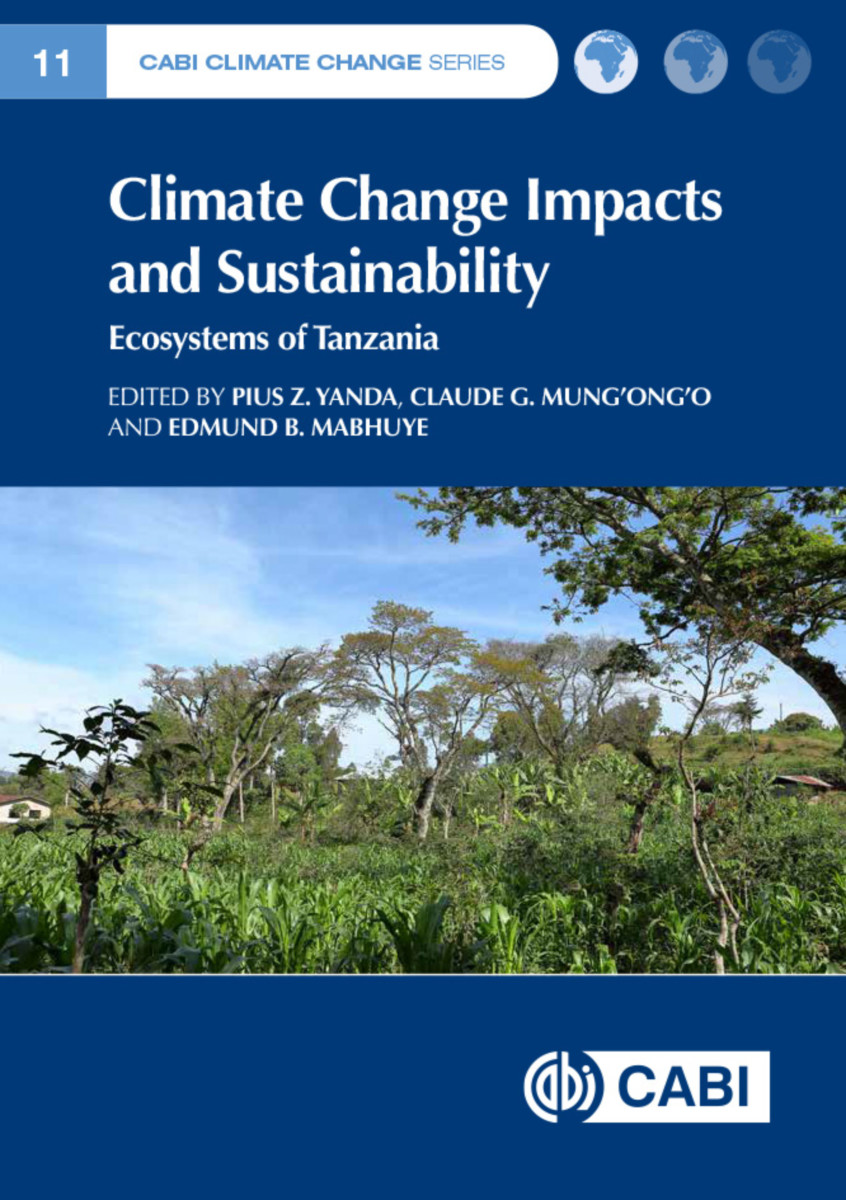Climate Change Impacts and Sustainability
Ecosystems of Tanzania
- Publisher
CABI - Published
3rd August 2020 - ISBN 9781789242966
- Language English
- Pages 264 pp.
- Size 6" x 9"
This book provides a detailed analysis of the economic and environmental impacts of climate change on the tropical ecosystems in Tanzania. Topics covered include agriculture, marine resources, wildlife, and weather forecasting.
The analyses concentrate on real and potential impacts of climate change, focusing on changes in temperature and precipitation. Adaptive capacity and strategies for enhancing resilience (such as changing crop types and crop patterns in farming) are described.
Particular attention is paid to climate change impacts on vulnerability and resilience in communities and ecosystems with special reference to extreme events such as droughts and flooding.
The book:
- is the first book to analyze in detail climate change effects in Tanzania, highlighting the unique vulnerability of communities and ecosystems in East Africa from a socio-ecological point of view
- discusses potential future threats as well as providing solutions to current problems
- examines the application of local knowledge systems when formulating solutions
1: Introduction
2: Living and Responding to Climate Variability and Change among Coffee and Banana Farmers in the Highlands of Moshi Rural District, Tanzania
3: Cassava as an Adaptation Crop to Climate Variability and Change in Coastal Areas of Tanzania: A Case of Mkuranga District
4: Agro-Ecosystems Resilience and Social-Ecological Vulnerability Index to Climate Change in Kilimanjaro, Tanzania
5: Effects of Conservation Agriculture on Farmers’ Livelihoods in the Face of Climate Change in Balaka District, Malawi
6: A Comparative Cost-Benefit Analysis of Mobile and Sedentary Pastoral Production Systems in Selected Villages in Northern Tanzania
7: Locally Based Responses to Impacts of Climate Change in Pastoral Landscapes of Northern Tanzania
8: Assessment of Socio-Ecological Resilience of Agro-Pastoralists to Climate Change and Variability Impacts in Bariadi District, Tanzania
9: Natural Resource Use Conflicts in a Changing Climate: The Case of the Wetlands of Kilombero and Kilosa Districts in Tanzania
10: The Role of Ecosystem Services in Enhancing Climate Change Resilience to Local Communities: The Case of Ngarambe - Tapika Wildlife Management Area, Rufiji District, Tanzania
11: Effectiveness of Existing Climate Smart Agricultural Practices in Tehuledere District, Northeastern Ethiopia
12: Community Livelihoods and Ecosystem Integrity in Makere Forest Reserve, Western Tanzania
13: Weather Forecasting and Communication in the Upper Great Ruaha Catchment Area
14: Lessons Learnt and the Way Forward for Research on Climate Change in Tanzania
Pius Z. Yanda
Pius Z. Yanda is a Research Professor at the Centre for Climate Change Studies of the University of Dar es Salaam, Dar es Salaam. He has served as a Regional Director for Pan African START Secretariat and National REDD+ Secretariat; and conducted a number of climate change related studies. Key focus areas have been on climate change impacts, mitigation and adaptation. He teaches courses on biodiversity conservation, science of climate change, vulnerability to impacts of climate change, responses to climate change, physical geography, remote sensing and GIS, Integrated Research Methodologies.
Claude G. Mung’ong’o
Claude G. Mung’ong’o is a retired Associate Research Professor at the Institute of Resource Assessment, University of Dar es Salaam, Dar es Salaam. Born in late 1946, he holds a PhD degree in Geography and Environmental Science from Stockholm University, Sweden, and has more than 30 years of research experience in Environmental Sociology (including climate change), Pastoral Livelihood Analysis and Food Security, and general rural development. He has been involved in numerous socio-economic studies as a member of various natural resource use studies. He has taught several post-graduate courses at the University of Dar es Salaam, including the Political ecology of natural resource management, Social survey methods, Impacts of climate change on human society and ecosystems, and Pastoralism and climate change governance.
Edmund B. Mabhuye
Dr. Edmund B. Mabhuye is a lecturer in the institute of Resource Assessment at the University of Dar es Salaam, Tanzania.


